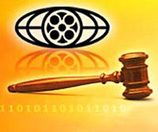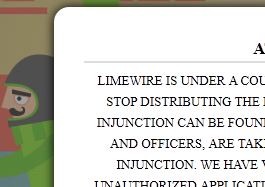Last October, a federal court shut down peer-to-peer file-sharing service LimeWire. Yesterday, the defunct company agreed to fork over $105 million to to settle a copyright infringement suit brought by 13 record labels. [More]
riaa

Jury Slaps File Sharer With $1.5 Million Penalty Over 24 Songs
The third time was not the charm for Jamie Thomas-Rasset, who has spent the last several years wrapped up legal wranglings with the Recording Industry Association of America over 24 songs she downloaded through Kazaa back when people still used Kazaa. The latest development — a jury in her third trial has found her liable for $1.5 million ($62,500/song) in damages to Capitol Records. [More]

Federal Court Shuts Down LimeWire With Permanent Injunction
LimeWire, the Gnutella-based peer-to-peer file-sharing service, is no more. Major record labels, also known as file-sharers’ archnemesis the RIAA, obtained an injunction from a U.S. District Court judge in New York City that stops Limewire from distributing their software or facilitating any file-sharing. [More]

Judge Slashes RIAA's $675,000 File Sharing Award To $67,500
A federal judge yesterday bench slapped the Recording Industry of America, calling a jury’s $675,000 verdict against file sharer Joel Tenenbaum both eye-popping and unconstitutional. The judge struck a strikingly populist tone in reducing the verdict to $67,500, arguing that the same legal reasoning that protects large corporations from excessive punitive damages also protects “ordinary people” like Tenenbaum. [More]

4 Years And 2 Trials Later, The $1.92 Million RIAA Case Continues
Remember Jammie Thomas-Rasset? She was accused of sharing 24 songs on Kazaa in 2006. Two trials and four years later, the case still isn’t over. They’re now trying to avoid a third trial. [More]

Like Everything Else Copyright Problems Are Simpler On TV
In TV Land, where murders are solved and prosecuted in an hour and family issues are wrapped up in a cool 30 minutes there is a new problem being simplified — copyright infringement. Despite being brought to us by Rupert Murdoch, Fox’s Glee is full of depictions of behavior that News Corp supposedly objects too. [More]

Pirate Bay Spreads Word About '$675K Mix Tape Tribute To Nabbed Downloader
Remember Joel Tenenbaum, the guy who was busted for downloading 30 songs and ordered to pay $675,000 to the Recording Industry of America?

30 Songs? That'll Be $675,000
A Boston jury yesterday ruled that file sharer Joel Tenenbaum would have to pay the Recording Industry of America $675,000 for sharing 30 copyrighted songs. The hefty award was all the more surprising because Tenenbaum was represented by a crack team of legal eagles from Harvard’s law school. The trial didn’t unfold nearly the way they planned…

ASCAP Wants Royalties On Ringtones
Not content to let the RIAA get all the recent publicity for stupid lawsuits, ASCAP has sued AT&T over sales of ringtones, saying each time a ringtone plays it’s a public performance and royalties should be paid. Luckily (?) for consumers, ASCAP wants AT&T, not individuals, to pay—although we wonder what they’ll say when you take a track from your own library and make a ringtone out of it.

Good Day For Bad Guys: Court Says 'Pirate' Jammie Thomas-Rasset Must Pay RIAA $1.92 Mill
The long, sad saga of lawsuit-bedeviled MP3-ripper Jammie Thomas-Rasset reached a harrowing twist Thursday when Minneapolis federal court found her guilty of willful copyright infringement for sharing more than 1,700 songs. The judge says she owes the RIAA $1.92 million.

Is Last.fm Sharing User Data With The RIAA?
TechCrunch has published a damning rumor accusing the social music site Last.fm of helping the RIAA find users who downloaded leaked copies of U2’s new album. Relying on a tip, TechCrunch claims that the Last.fm, a subsidiary of CBS, handed over a “giant dump of user data to track down people who are scrobbling unreleased tracks.”

Apple: Give Us Money And We'll Remove DRM From Your Music
Apple has dropped DRM from iTunes — and is offering to remove their DRM from music you already bought for the low, low fee of $0.30 per song.

RIAA To Stop Suing File Sharers
The Wall Street Journal and Ars Technica are reporting that the RIAA has announced a fairly dramatic change in its strategy to fight piracy.

Judge Tosses Out $222,000 Verdict Against Mom Accused Of File Sharing
The only jury verdict against a file-sharer has been thrown out by U.S. District Judge Michael Davis of Duluth, Minnesota, who declared a mistrial because he had committed “manifest error of the law” by instructing the jury that “that the recording industry did not have to prove anybody downloaded the songs from Thomas’ open Kazaa share folder.”
../../../..//2008/07/25/yet-another-example-of-why/
Yet another example of why DRM sucks: Yahoo! is shutting down their music store. Don’t worry, all you have to do is burn all that music to CD then re-upload it to your computer. As Ars Technica says: “Sure, you’ll lose a bunch of blank CDs, sound quality, and all the metadata, but that’s a small price to pay for the privilege of being able to listen to that music you lawfully acquired. Good thing you didn’t download it illegally or just buy it on CD!” [Ars Technica]

The MPAA Says They Shouldn't Need Proof To Sue You
A legal brief submitted by an attorney representing The Motion Picture Association of America states that intellectual-property holders should have the right to collect up to $150,000 per violation without having to actually prove copyright infringement, Wired reports. The MPAA attorney, who seems to feel very inconvenienced by the whole “due process” thing writes, “It is often very difficult, and in some cases, impossible, to provide such direct proof when confronting modern forms of copyright infringement, whether over P2P networks or otherwise; understandably, copyright infringers typically do not keep records of infringement.” Details, inside…

The Methods That Target DMCA Violators Are Flawed
When we read stories like Tanya Andersen’s and consider the countless others who have been wrongfully targeted by trade groups like the RIAA, it becomes evident that the system by which DMCA takedown notices are issued is very far from perfect. For the uninitiated, DMCA (Digital Millennium Copyright Act) takedown notices are official statements which assert that an artist’s or company’s intellectual rights have been violated (i.e. copyright infringement) and often threaten legal action against an individual. In a study conducted by the University of Washington, researchers proved that this system is seriously flawed, according to the New York Times. In one experiment, the team received takedown notices from the MPAA which accused 3 laserjet printers of downloading the latest Indiana Jones movie and Iron Man. More, inside…

RIAA Pulls Case Before It Can Be Dismissed, Then Refiles Days Later To Get Different Judge
If you were still somehow unconvinced that the RIAA’s legal strategy is “be sleazy, intimidate, then profit,” their latest legal maneuvering might finally convince you. Next week, a judge was to decide whether their case against a New York family should be thrown out—the family’s lawyer, RIAA critic Ray Beckerman, argued “that if the RIAA can’t prove anybody downloaded the music from an open share folder, then the case would have to be dismissed.”


